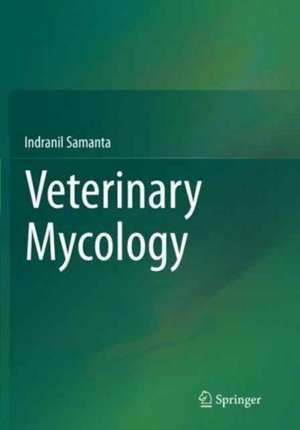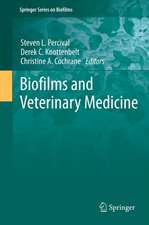Veterinary Mycology
Autor Indranil Samantaen Limba Engleză Paperback – 11 oct 2016
| Toate formatele și edițiile | Preț | Express |
|---|---|---|
| Paperback (1) | 627.48 lei 38-45 zile | |
| Springer India – 11 oct 2016 | 627.48 lei 38-45 zile | |
| Hardback (1) | 1004.19 lei 6-8 săpt. | |
| Springer India – 23 mar 2015 | 1004.19 lei 6-8 săpt. |
Preț: 627.48 lei
Preț vechi: 825.64 lei
-24% Nou
Puncte Express: 941
Preț estimativ în valută:
120.09€ • 124.42$ • 100.22£
120.09€ • 124.42$ • 100.22£
Carte tipărită la comandă
Livrare economică 17-24 martie
Preluare comenzi: 021 569.72.76
Specificații
ISBN-13: 9788132229469
ISBN-10: 8132229460
Pagini: 198
Ilustrații: XIX, 179 p. 52 illus., 27 illus. in color.
Dimensiuni: 178 x 254 mm
Greutate: 0.32 kg
Ediția:Softcover reprint of the original 1st ed. 2015
Editura: Springer India
Colecția Springer
Locul publicării:New Delhi, India
ISBN-10: 8132229460
Pagini: 198
Ilustrații: XIX, 179 p. 52 illus., 27 illus. in color.
Dimensiuni: 178 x 254 mm
Greutate: 0.32 kg
Ediția:Softcover reprint of the original 1st ed. 2015
Editura: Springer India
Colecția Springer
Locul publicării:New Delhi, India
Cuprins
1. History.- 2. General characteristics of fungi.- 3. Classification of fungi.- 4. Cutaneous, subcutaneous and systemic Mycology.- 5. Collection and processing of clinical material for isolation of fungi.- 6. Diagnostic techniques for fungi.
Recenzii
“The author combines traditional knowledge with thelatest information from basic science investigations and molecular diagnosticapproaches and summarizes the ever-changing taxonomy of fungal pathogens. Theintended audience includes undergraduate students, postgraduate student, andveterinary practitioners, and should also include veterinary students. … Thisbook is unique and valuable in the medical mycology community. … This book is asolid and current introduction to the most important veterinary pathogenicfungi.” (Lois L. Hoyer, Doody’s Book Reviews, December, 2015)
Notă biografică
Dr. Indranil Samanta obtained his Bachelor of Veterinary Sciences and Animal Husbandry degree (B.V.Sc. & A.H.) from West Bengal University of Animal and Fishery Sciences, Kolkata, India. He secured his Masters in Veterinary Sciences (M.V.Sc) in Veterinary Bacteriology and Mycology from Indian Veterinary Research Institute, Bareilly, UP, India and Doctor of Philosophy (Ph.D.) in Veterinary Microbiology from West Bengal University of Animal and Fishery Sciences, Kolkata, India. He works currently as Assistant Professor of Veterinary Microbiology in West Bengal University of Animal and Fishery Sciences, Kolkata, India. Previously he has also worked as Assistant Professor of Veterinary Microbiology in S. K. University of Agricultural Sciences and Technology-Kashmir, India and as Veterinary Officer, Government of West Bengal, India. He is actively engaged in teaching of undergraduate, post graduate and PhD scholars of Veterinary Microbiology and research related with animal health and zoonotically important microbes. He has received six grants from national funding agencies and he has supervised three post graduate scholars till date. He has published 70 research articles in reputed international and national journals along with review articles in international journals. His current total impact factor, h-index and total citations are 43.663, 10 and 250, respectively. He has published a textbook entitled ‘Veterinary Bacteriology’ (ISBN13: 9789381450550, ISBN 10:9381450552) from a reputed publisher. He is editorial board member and reviewer of international and national journals. He has delivered several talks in conferences, Government television and radio channels regarding his research and animal, poultry health related issues. He is the recipient of National Academy of Agricultural Sciences (NAAS) Associate, Government of India.
Textul de pe ultima copertă
This book is a comprehensive overview of the fungi that are clinically relevant for animals and humans. It is divided in three major parts: the first part comprises the history of veterinary and medical mycology, general aspects of morphology, growth, nutrition, reproduction and classification of fungi. In the second part, the etiologic agents of cutaneous, subcutaneous and systemic mycoses are described in detail with special emphasis on emerging and uncommon pathogenic fungi. Each chapter consists of a brief history and the morphology, classification, reproduction, susceptibility to disinfectants, natural habitat, distribution, genome, isolation, growth and colony characteristics, antigenic characteristics, virulence factors. The major diseases and their routes of transmission, pathogenesis, immunity, diagnosis and treatment are also covered. The third part focuses on laboratory diagnosis including clinical sample collection, their processing for fungal isolation, special stains for microscopic visualization, culture media composition and a relevant glossary. Each chapter includes color photographs, schematic diagrams and tables for better understanding.
Caracteristici
Provides the latest information on all facets of Veterinary Mycology
Starts with introduction of basic characteristics and classification of fungi, moves onto systematic mycology, focuses on fungi causing mastitis abortion and mycotoxicosis and concludes with collection, processing and diagnostic techniques for fungi
Will serve as a useful reference not only for the academicians but also for the professionals engaged in the animal disease diagnosis laboratory ?
Starts with introduction of basic characteristics and classification of fungi, moves onto systematic mycology, focuses on fungi causing mastitis abortion and mycotoxicosis and concludes with collection, processing and diagnostic techniques for fungi
Will serve as a useful reference not only for the academicians but also for the professionals engaged in the animal disease diagnosis laboratory ?



